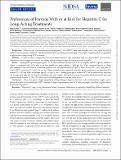Preferences of Persons With or at Risk for Hepatitis C for Long-Acting Treatments
Author(s)
Weld, Ethel D; Astemborski, Jacqueline; Kirk, Gregory D; Sulkowski, Mark S; Katz, Stephanie; Rothman, Richard; Solomon, Sunil S; Matthews, Gail V; Hsieh, Yu Hsiang; Verma, Malvika; Traverso, Giovanni; Swindells, Susan; Owen, Andrew; Feld, Jordan; Flexner, Charles; Mehta, Shruti H; Thomas, David L; ... Show more Show less
DownloadPublished version (769.3Kb)
Publisher Policy
Publisher Policy
Article is made available in accordance with the publisher's policy and may be subject to US copyright law. Please refer to the publisher's site for terms of use.
Terms of use
Metadata
Show full item recordAbstract
Background
Whereas safe, curative treatments for hepatitis C virus (HCV) have been available since 2015, there are still 58 million infected persons worldwide, and global elimination may require new paradigms. We sought to understand the acceptability of approaches to long-acting HCV treatment.
Methods
A cross-sectional, 43-question survey was administered to 1457 individuals with or at risk of HCV at 28 sites in 9 countries to assess comparative interest in a variety of long-acting strategies in comparison with oral pills.
Results
Among HCV-positive participants, 37.7% most preferred an injection, 5.6% an implant, and 6% a gastric residence device, as compared with 50.8% who stated they would most prefer taking 1–3 pills per day. When compared directly to taking pills, differences were observed in the relative preference for an injection based on age (P<.001), location (P<.001), and prior receipt of HCV treatment (P=.005) but not sex. When an implant was compared with pills, greater preference was represented by women (P=.01) and adults of younger ages (P=.01 per 5 years). Among participants without HCV, 49.5% believed that injections are stronger than pills and 34.7% preferred taking injections to pills. Among those at-risk participants who had received injectable medications in the past, 123 of 137 (89.8%) expressed willingness to receive one in the future.
Conclusions
These data point to high acceptability of long-acting treatments, which for a substantial minority might even be preferred to pills for the treatment of HCV infection. Long-acting treatments for HCV infection might contribute to global efforts to eliminate hepatitis C.
Date issued
2021-10-26Department
Massachusetts Institute of Technology. Department of Biological Engineering; Massachusetts Institute of Technology. Department of Mechanical EngineeringJournal
Clinical Infectious Diseases
Publisher
Oxford University Press
Citation
thel D Weld, Jacqueline Astemborski, Gregory D Kirk, Mark S Sulkowski, Stephanie Katz, Richard Rothman, Sunil S Solomon, Gail V Matthews, Yu Hsiang Hsieh, Malvika Verma, Giovanni Traverso, Susan Swindells, Andrew Owen, Jordan Feld, Charles Flexner, Shruti H Mehta, David L Thomas, Preferences of Persons With or at Risk for Hepatitis C for Long-Acting Treatments, Clinical Infectious Diseases, Volume 75, Issue 1, 1 July 2022, Pages 3–10.
Version: Final published version
ISSN
1058-4838
1537-6591